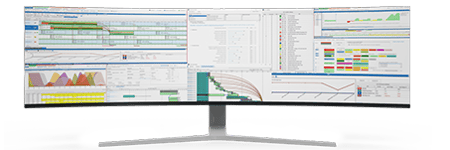
Achieving Demand-Driven Scheduling in Food and Beverage Manufacturing
Faced with fluctuating consumer demands, shorter product lifecycles, and tighter regulatory pressures, plant managers need robust strategies and tools to optimize production schedules and stay competitive.
Integrating advanced scheduling tools like PlanetTogether with enterprise systems such as SAP, Oracle, Microsoft Dynamics, Kinaxis, or Aveva offers a powerful way to achieve demand-driven scheduling while balancing operational efficiency and cost-effectiveness.

The Importance of Demand-Driven Scheduling
Demand-driven scheduling focuses on aligning production plans with real-time consumer demand rather than relying on static forecasts. This approach is particularly critical in food and beverage manufacturing due to:
Perishable Inventory: Unlike other industries, food products often have a limited shelf life, making precise scheduling essential to minimize waste.
Regulatory Compliance: Changes in demand must not compromise adherence to safety and quality standards.
Consumer Preferences: Shifts in consumer behavior, such as the rise in plant-based products or health-conscious options, require manufacturers to adapt quickly.
Seasonality: Demand fluctuations tied to holidays or seasonal products need careful planning to avoid overproduction or shortages.


Integrating PlanetTogether with Enterprise Systems
PlanetTogether's advanced production scheduling capabilities provide the flexibility and intelligence needed for demand-driven scheduling. When integrated with ERP systems like SAP, Oracle, Microsoft Dynamics, Kinaxis, or Aveva, it creates a unified platform for seamless data flow, enabling plant managers to make informed, real-time decisions.
Key Benefits of Integration
Enhanced Visibility
Integration allows data from sales, inventory, and production to flow seamlessly between PlanetTogether and ERP systems. Plant managers gain a holistic view of the supply chain, helping them adjust schedules based on real-time demand changes.
Improved Forecast Accuracy
Demand forecasts generated in systems like SAP or Kinaxis can feed directly into PlanetTogether. The scheduling tool then optimizes production plans by considering constraints such as machine availability and labor shifts.
Agility in Production
Oracle and Microsoft Dynamics excel at demand planning, but their effectiveness is amplified when combined with PlanetTogether’s ability to quickly reschedule production in response to last-minute order changes or disruptions.
Minimized Waste and Costs
By aligning production with actual demand, manufacturers can reduce excess inventory and raw material waste. Integration also helps optimize batch sizes and machine utilization, lowering operational costs.
Regulatory Compliance
Aveva’s integration with PlanetTogether supports traceability and compliance by ensuring that production schedules account for quality checks and safety standards without compromising timelines.
Achieving demand-driven scheduling in food and beverage manufacturing is a game-changer, allowing plants to respond swiftly to market fluctuations while minimizing costs and waste. The integration of PlanetTogether with ERP systems like SAP, Oracle, Microsoft Dynamics, Kinaxis, or Aveva provides a robust framework for plant managers to align production with real-time demand seamlessly.
By leveraging these tools and adopting best practices, plant managers can transition from reactive to proactive scheduling, positioning their facilities as leaders in efficiency, agility, and sustainability. Now is the time to embrace integration and redefine what’s possible in food and beverage manufacturing.
Are you ready to take your manufacturing operations to the next level? Contact us today to learn more about how PlanetTogether can help you achieve your goals and drive success in your industry.


